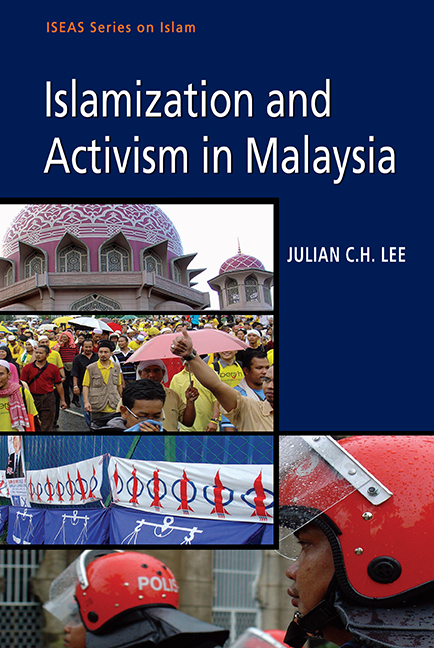Book contents
- Frontmatter
- Dedication
- Contents
- Acknowledgements
- Abbreviations
- Introduction
- 1 On Islam, Democracy, and Activism
- 2 A Short History of Malaysia
- 3 Malaysia as an Islamic State: The Debate
- 4 Conflict of Jurisdiction: Civil versus Syariah Law
- 5 Islamist Lawyers’ Views
- 6 Social Activism and the Article 11 Coalition
- 7 Questioning Orthodoxies, Criticizing Zealotry
- 8 Electoral Engagements
- Conclusion: Islam, Democracy, and Activism in Malaysia
- Bibliography
- Index
- About the Author
- Plate section
1 - On Islam, Democracy, and Activism
Published online by Cambridge University Press: 21 October 2015
- Frontmatter
- Dedication
- Contents
- Acknowledgements
- Abbreviations
- Introduction
- 1 On Islam, Democracy, and Activism
- 2 A Short History of Malaysia
- 3 Malaysia as an Islamic State: The Debate
- 4 Conflict of Jurisdiction: Civil versus Syariah Law
- 5 Islamist Lawyers’ Views
- 6 Social Activism and the Article 11 Coalition
- 7 Questioning Orthodoxies, Criticizing Zealotry
- 8 Electoral Engagements
- Conclusion: Islam, Democracy, and Activism in Malaysia
- Bibliography
- Index
- About the Author
- Plate section
Summary
WHY MALAYSIA?
Malaysia recapitulates some global trends and issues relating to the management of national, ethnic, and religious sentiments. One current issue, both in Malaysia and on the world stage, is Islam's putative intolerance of what are for some basic political freedoms. The “cartoon row” that emerged in 2005 typifies some of this. Although the initial Danish context had its own complexity (see Linde-Laursen 2007), the “cartoon row”, which began with a depiction of the Prophet Muhammad as a terrorist, was experienced by many Muslims as demonstrating the West's continuing and flagrant disrespect of them and their religion, albeit under the banner of the Western secular value of freedom of expression. As Karen Armstrong suggests, “fearful of the hostility in Europe and bombarded with images from Guantanamo Bay and Abu Ghraib, many [Muslims] experienced the gratuitous vilification of their prophet as the last straw” (2006).
With distinct similarities to the affair over Salman Rushdie's The Satanic Verses (for discussions, see Armstrong 1993 passim; Asad 1990), many in Western countries regarded the apparent reaction of Muslims as an unwarranted imposition of their religious beliefs on others. The popular commentator and author Christopher Hitchens, for example, criticized the U.S. State Department for denouncing the cartoons that sparked the riots. Acknowledging the prohibitions that many Muslims have on depicting their prophet, and on drinking alcohol and eating pork, Hitchens writes, “let a good Muslim abstain rigorously from all these. But if he claims the right to make me abstain as well, he offers the clearest possible warning and proof of an aggressive intent” (Hitchens 2006). A (secular) civil society means, Hitchens continues, “that free expression trumps the emotions of anyone to whom free expression might be inconvenient”.
In Malaysia demands for freedoms and liberties are often denied on the grounds that Muslims’ sensitivities must be respected. Most Muslims are ethnic Malays who, along with (non-Malay) indigenous Malaysians bare termed bumiputera (sons of the soil). As of 2007, Malays made up just over 50 per cent of Malaysia's population of 27 million, but bumiputera altogether made up just over 60 per cent (see Syed H.A. 2008a, p. 202).
- Type
- Chapter
- Information
- Islamization and Activism in Malaysia , pp. 11 - 35Publisher: ISEAS–Yusof Ishak InstitutePrint publication year: 2010

